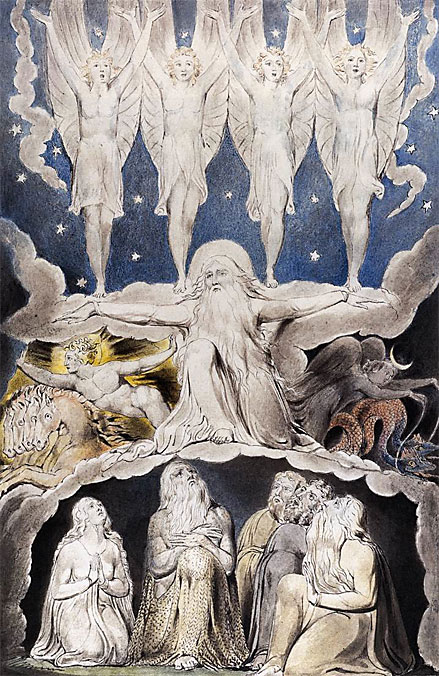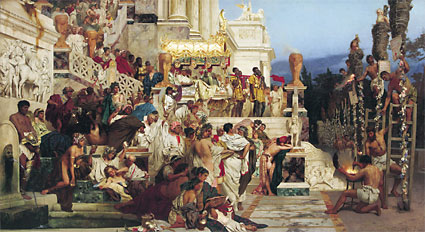Jan
27
2010

In Envy and the Sons of God, I wrote:
…those with the title “the sons of God” in Job were not angels but priestly, mediatorial men (an observation I have heard from Gary DeMar). Satan envied them, accused them, as he always does. They are Adams in the garden, Covenant heads, and he hates them. Job was a priest-king.
DeMar has also just published an article on Job in the last few days that deals with the crazy angel/human hybrid Nephilim theory, and of necessity covers the identity of the sons of God.
Continue reading
6 comments | tags: Bible Matrix, Gary DeMar, Job, Luther, Satan, Toby Sumpter | posted in Biblical Theology
Nov
7
2009

“…one of the most common sacrifices in Scripture is the OLAH, what is commonly translated burnt offering or whole burnt offering, but the word OLAH literally means “going up.” The “going up offering” or Ascension Offering reveals a foundational clue to all sacrifice. It establishes a central goal of every offering by fire. When a blameless animal is sacrificed, the blameless animal is going up, going up to God in smoke. God loves the perfect, he loves the blameless, and he loves them in his presence. He loves them and wants them to commune with him.
Continue reading
Comments Off | tags: Ascension, Job, Toby Sumpter | posted in Biblical Theology, Quotes
Jun
15
2009
From Peter Leithart today:
“With what disgust, contempt, and hatred Christ must look upon every second of our lives, the reviewing of which must be a long torture for us, were such a judgment in our future!”
These are the words of a Presbyterian minister, writing in a prominent evangelical magazine. He’s trying to refute the belief that we’ll be judged according to works at the last day. He’s wrong on that point. Continue reading
Comments Off | tags: Confession, Job, Liturgy, Peter Leithart, Satan | posted in Christian Life
Apr
10
2009
Do the words ‘Love, joy, peace, patience, kindness, self-control’ make you think of old ladies, tea cups, embroidered Bible bookmarks and homemade jam?

Perhaps if we looked to the Old Testament for examples of godliness instead of 19th century pietism we men would do better and so would our churches.
Think of Abraham’s kindness as he plunders the kings of the plain to rescue his nephew! His self-control as he refuses the riches of Egypt and Sodom! Solomon’s national peace after the destruction of his father’s enemies! His throwing of loud, generous and very alcoholic parties to express his joy! Because of their great love, Paul risking his life to stand and preach publicly, and Jesus using cutting words to tell off the Jews for their neglect of mercy and justice. And of course, the very masculine patience of Job in the face of continuous accusations.
These might seem a bit offbeat, but it would sure help us to think more this way. If these don’t sound very Christian you should read your Bible instead of your embroidered bookmark. Otherwise, go ahead and join the Women’s Guild.
I guess it boils down to active versus passive godliness.
Comments Off | tags: Abraham, Job, Masculinity, Paul, Solomon | posted in Christian Life
Apr
8
2009
In Hebrew, vindication and redemption are one word. When Job was confident that his redeemer lived, he was looking forward to his vindication against his “comforters.”
Jesus’ words against the Temple hung over Jerusalem for a generation, and would be vindicated despite Herod’s obsessive glorification of his graven image. Its completion in AD64 was taken as proof that Jesus was indeed a false prophet.
Christ came in judgment as He promised and the Temple was destroyed. Vindication and redemption came in one event, and new worship would be born through the death of the old.
“The pagan view of law is that justice is a balancing of the scales. The biblical view of law is that justice is transformational.”1
The death and resurrection of Israel in Christ as the head would be measured out in the people of God as the body. God’s Word brings division that leads totransfiguration. His justice always has one eye on the future.
1 James B. Jordan, Preterism vs. Gnosticism [lecture]. Available from www.wordmp3.com
Comments Off | tags: James Jordan, Job, Justice, Temple, Vindication | posted in Biblical Theology, Ethics
Apr
8
2009

“…since we have so great a cloud of witnesses surrounding us…” (Hebrews 12:1)
NOTE: THIS POST HAS BEEN REMIXED AND INCLUDED IN GOD’S KITCHEN.
To defeat Satan is to expose his lies to the truth – to unmask him. We see lots of unmaskings in the Bible. Many of these use the saints as bait. The true natures of Pharaoh, of Job’s accusers, and of Haman and the enemies of God in Esther were all exposed when God’s people became weak. A corpse always brings out the dirty birds (Matthew 24:28), the ‘Edomite’ false brothers waiting to loot a razed Jerusalem.
Continue reading
1 comment | tags: James Jordan, Job, Nero, Pharaoh, Postmillennialism, Satan, Witness | posted in Biblical Theology
Apr
8
2009
“Even if Noah, Daniel, and Job were living in that nation, their faithfulness would not save anyone but themselves. …even if Noah, Daniel, and Job were living there, I, the Lord, promise that the children of these faithful men would also die. Only the three of them would be spared.” (Ezekiel 14:14, 20)
 The mediation of even the holiest men would not avert God’s judgments. Noah had failed to prevent the destruction of the old world. Daniel had failed to prevent the destruction of the Land. Job had failed to prevent the destruction of his children. Like the three domains under these men, Jerusalem was beyond deliverance. And even if these holy watchmen were present in Jerusalem, they alone would be saved. These three only would be rescued from Sodom like Lot. In chapter 23, Ezekiel refers to Jerusalem as Sodom. Jerusalem the oppressor was also like Egypt. As the Land symbolically had four corners, four judgments would desolate it: sword, famine, beasts and pestilence, the Covenant curses from Leviticus 26. This was the Levitical sword indeed. The exiles, as watchmen, would see the repentance of the “marked” survivors and know that the Lord had not acted without cause.
The mediation of even the holiest men would not avert God’s judgments. Noah had failed to prevent the destruction of the old world. Daniel had failed to prevent the destruction of the Land. Job had failed to prevent the destruction of his children. Like the three domains under these men, Jerusalem was beyond deliverance. And even if these holy watchmen were present in Jerusalem, they alone would be saved. These three only would be rescued from Sodom like Lot. In chapter 23, Ezekiel refers to Jerusalem as Sodom. Jerusalem the oppressor was also like Egypt. As the Land symbolically had four corners, four judgments would desolate it: sword, famine, beasts and pestilence, the Covenant curses from Leviticus 26. This was the Levitical sword indeed. The exiles, as watchmen, would see the repentance of the “marked” survivors and know that the Lord had not acted without cause.
Comments Off | tags: Daniel, Egypt, Ezekiel, Job, Noah, Sodom | posted in Biblical Theology, Totus Christus






























